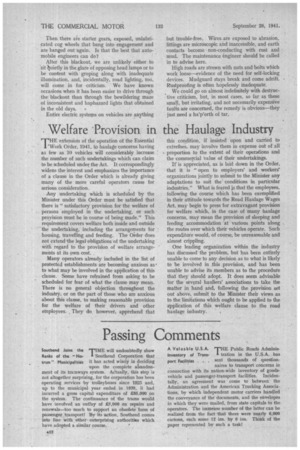Welfare . Provision in
Page 14

If you've noticed an error in this article please click here to report it so we can fix it.
the Haulage Industry
THE extension of the operation of the Essential Work Order, 1941, to haulage concerns having as few as 10 vehicles will considerably increase the number of such undertakings which can claim to be scheduled under the Act. It correspondingly widens the interest and emphasizes the importance of a clause in the Order which is already giving many of the more careful operators cause for serious consideration.
Any undertaking which is scheduled by the Minister under this Order must be satisfied that there is " satisfactory provision for the welfare of persons employed in the undertaking, or such provision must be in course of being made." This requirement covers welfare both inside and outside the undertaking, including the arrangements for housing, travelling and feeding. The Order does not extend the legal obligations of the undertaking with regard to the provision of welfare arrangements at its own cost. .
Many operators already included in the list of protected establishments are becoming anxious as to what may be involved in the application of this clause. Some have refrained from asking to be scheduled for fear of what the clause may mean. There is no general objection throughout the industry, or on the part of those who are anxious about this clause, to making reasonable provision for the welfare of their drivers and other employees. They do. however, apprehend that this condition, if insisted upon and carried to extreines, may involve them in expense out of all proportion to the extent of their operations and the commercial value of their undertakings.
If is appreciated, as is laid down in the Order, that it is "open to employers' and workers' organizations jointly to submit to the Minister any adaptations to suit the conditions in particular industries." What is feared is that the employees, following the course which has been exemplified in their attitude towards the Road Haulage Wages Act, may begin to press for extravagant provision for welfare which, in the case of many haulage concerns, may mean the provision of sleeping and feeding accommodation at various points along the routes over which their vehicles operate. Such expenditure would, of course, be unreasonable and almost crippling.
One leading organization within the industry has discussed the problem, but has been entirely unable to come to any decision as to what is likely to be involved in this provision, and has been unable to advise its members as to the procedure that they should adopt. It does seem advisable for the several hauliers' associations to take the matter in hand and, following the provision set out above, submit to the Minister their views as to the limitations which ought to be applied to the application of this welfare clause to the road haulage industry.




















































